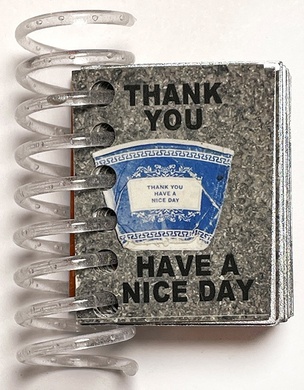Reflecting on gaze and the act of seeing, this book opens with three perplexing statements – each one appears to be true and correct, yet in their correctness, they seem to contradict one another;
“There is no other subject than the irruption of light on the retina.”
“One does not see only with the eyes: one sees with all that one knows.”
“A look is already an intervention; as soon as it’s seen, a scene is
already modified.”
Then a bewildering parade of diptychs begins its course, without a defined subject, or a common geography or specific time to help unravel the secret thread that ties them together.
“We’ve spent all this time looking at the same things, but that doesn’t mean we’ve seen the same things,” says one of the two short texts by French novelist Jakuta Alikavazovic, who was asked by photographer Julien Gester to poeticly frame his pictures without describing, captioning, or circumscribing them.
Following a documentary and contemplative approach in their creation, the photographs in this book were taken over a few years in Western and Eastern Europe, Asia, Africa, and North and South America. Each image is rooted in a specific socio-geographic reality, but their association makes them resonate through the broader perspective of a world full of ambiguities, archetypes, accidents and encounters with light, colors and ordinary beauty.
Echoing its cryptic title, the enigmatic diptychs in Cette fin du monde nous aura quand même donné de beaux couchers de soleil (“At Least the End of the World Gave Us Nice Sunsets) are brimming with dormant dramas and captured within moments loaded with indecision, uncertainty and impalpable tension. It is up to each viewer to recompose, or invent, which strange, subterranean narrative unfolds between these scenes scenes fleshed out of a reality that appears to be haunted by fiction.














![Protect Me From What I Want Wooden Postcard [Gold Text]](https://d23eqwv5slm408.cloudfront.net/api/file/1rE09CiPQpGMa3jDySHP/convert?fit=max&h=480&w=304&compress=true&fit=max)
![Words Tend To Be Inadequate Wooden Postcard [Gold Text]](https://d23eqwv5slm408.cloudfront.net/api/file/HhtS8vASTpWSUA41En0s/convert?fit=max&h=480&w=304&compress=true&fit=max)

![All Things are Delicately Interconnected Wooden Postcard [Gold Text]](https://d23eqwv5slm408.cloudfront.net/api/file/muHR6MdRL6EgJe6ATC1m/convert?fit=max&h=480&w=304&compress=true&fit=max)

![Protect Me From What I Want Wooden Postcard [Red Text]](https://d23eqwv5slm408.cloudfront.net/api/file/xKZZfpWNQRChHZkrFntw/convert?fit=max&h=480&w=304&compress=true&fit=max)
![All Things Are Delicately Interconnected Wooden Postcard [Red Text]](https://d23eqwv5slm408.cloudfront.net/api/file/C6N6ppL6SnKYeXJuCtbd/convert?fit=max&h=480&w=304&compress=true&fit=max)







![In a Dream You Saw a Way to Survive and You Were Full of Joy Wooden Postcard [Black Text]](https://d23eqwv5slm408.cloudfront.net/api/file/WEd4Y05lROcLsySIoRfJ/convert?fit=max&h=480&w=304&compress=true&fit=max)
![Raise Boys and Girls the Same Way Wooden Postcard [Red Text]](https://d23eqwv5slm408.cloudfront.net/api/file/uV8m1BsaQ6OCflSE578g/convert?fit=max&h=480&w=304&compress=true&fit=max)
![Money Creates Taste Wooden Postcard [Black Text]](https://d23eqwv5slm408.cloudfront.net/api/file/FDyWtNrERsKaawMR4dY8/convert?fit=max&h=480&w=304&compress=true&fit=max)
![The Breakdown Comes When You Stop Controlling Yourself and Want the Release of a Bloodbath Wooden Postcard [Black Text]](https://d23eqwv5slm408.cloudfront.net/api/file/Yq72qCUcTzenjZPmDHHH/convert?fit=max&h=480&w=304&compress=true&fit=max)

![Expiring for Love is Beautiful But Stupid Wooden Postcard [Red Text]](https://d23eqwv5slm408.cloudfront.net/api/file/PT3j9ljKSpS25IO8wycY/convert?fit=max&h=480&w=304&compress=true&fit=max)
![You Are Guileless In Your Dreams Wooden Postcard [Red Text]](https://d23eqwv5slm408.cloudfront.net/api/file/ZK3xDij0TaSAYgCc33sM/convert?fit=max&h=480&w=304&compress=true&fit=max)


![Money Can Buy You Love [Postcard]](https://d23eqwv5slm408.cloudfront.net/api/file/xZZhOmzTJiMu3SC7vLlT/convert?fit=max&h=480&w=304&compress=true&fit=max)


![To Buy Or Not To Buy [Postcard]](https://d23eqwv5slm408.cloudfront.net/api/file/OHBW6G4RGKh49ott8liS/convert?fit=max&h=480&w=304&compress=true&fit=max)

![Private Property Created Crime Wooden Postcard [Black Text]](https://d23eqwv5slm408.cloudfront.net/api/file/KI5UbFcfScGfPtZgAdYY/convert?fit=max&h=480&w=304&compress=true&fit=max)
![Untitled Film Still #21, 1978 [Postcard]](https://d23eqwv5slm408.cloudfront.net/api/file/aPsUudHwRDWz2SwOpwRg/convert?fit=max&h=480&w=304&compress=true&fit=max)
![Untitled [Business as usual] Tote Bag](https://d23eqwv5slm408.cloudfront.net/api/file/5dklHZepSsuX52IdaAV6/convert?fit=max&h=480&w=304&compress=true&fit=max)
















![2025 Slingshot Spiral Desk Organizer [Large]](https://d23eqwv5slm408.cloudfront.net/api/file/ZgnUiIyGQvCJckBO913B/convert?fit=max&h=480&w=304&compress=true&fit=max)
![2025 Slingshot Spiral Organizer [Small]](https://d23eqwv5slm408.cloudfront.net/api/file/KZ7ZLJgxSUOwmKWv37hA/convert?fit=max&h=480&w=304&compress=true&fit=max)







![Blue Moon Ari Marcopoulos T-Shirt [X-LARGE]](https://d23eqwv5slm408.cloudfront.net/api/file/uSvA0LwzRlC8ZekANYmI/convert?fit=max&h=480&w=304&compress=true&fit=max)
![Blue Moon Ari Marcopoulos T-Shirt [LARGE]](https://d23eqwv5slm408.cloudfront.net/api/file/RVRQRVnRQtujs9DmAyCs/convert?fit=max&h=480&w=304&compress=true&fit=max)
![Blue Moon Ari Marcopoulos T-Shirt [MEDIUM]](https://d23eqwv5slm408.cloudfront.net/api/file/v9V1Mlb3RfSvN9glBNMt/convert?fit=max&h=480&w=304&compress=true&fit=max)
![Blue Moon Ari Marcopoulos T-Shirt [SMALL]](https://d23eqwv5slm408.cloudfront.net/api/file/qtNAgHVcRaqHCzkAx5B2/convert?fit=max&h=480&w=304&compress=true&fit=max)
![2025 Slingshot Organizer [Pocket Classic]](https://d23eqwv5slm408.cloudfront.net/api/file/TvyPY1HQySS4aIlgwaK2/convert?fit=max&h=480&w=304&compress=true&fit=max)
